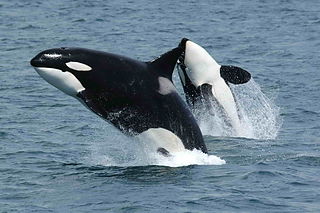
The orca, or killer whale, is a toothed whale that is the largest member of the oceanic dolphin family. It is the only extant species in the genus Orcinus. Orcas are recognizable by their black-and-white patterned body. A cosmopolitan species, they are found in diverse marine environments, from Arctic to Antarctic regions to tropical seas.
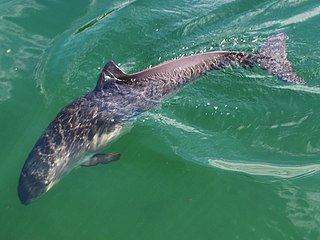
Porpoises are small dolphin-like cetaceans classified under the family Phocoenidae. Although similar in appearance to dolphins, they are more closely related to narwhals and belugas than to the true dolphins. There are eight extant species of porpoise, all among the smallest of the toothed whales. Porpoises are distinguished from dolphins by their flattened, spade-shaped teeth distinct from the conical teeth of dolphins, and lack of a pronounced beak, although some dolphins also lack a pronounced beak. Porpoises, and other cetaceans, belong to the clade Cetartiodactyla with even-toed ungulates.

Keiko was a male orca captured in the Atlantic Ocean near Iceland in 1979. He was best known for his portrayal of Willy in the 1993 film Free Willy. In 1996, Warner Bros. and the International Marine Mammal Project collaborated to return Keiko to the wild. After years of preparing Keiko for reintegration, Keiko was flown to Iceland in 1998 and in 2002, became the first captive orca to be fully released back into the ocean. On 12 December 2003, he died of pneumonia in a bay in Norway at the age of 27.

The false killer whale is a species of oceanic dolphin that is the only extant representative of the genus Pseudorca. It is found in oceans worldwide but mainly in tropical regions. It was first described in 1846 as a species of porpoise based on a skull, which was revised when the first carcasses were observed in 1861. The name "false killer whale" comes from having a skull similar to the orca, or killer whale.

Georgia Aquarium is a public aquarium in Atlanta, Georgia, United States. The aquarium exhibits hundreds of species and thousands of animals across its seven major galleries, all of which reside in more than 11 million US gallons (42,000 m3) of water. It was the largest aquarium in the world from its opening in 2005 until 2012 when it was surpassed by the S.E.A. Aquarium in Singapore and the Chimelong Ocean Kingdom in China; the Georgia Aquarium remains the largest aquarium in the United States and the sixth largest in the world.
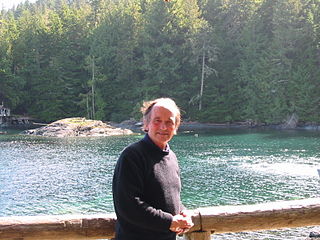
Paul Spong is a New Zealand-born Canadian cetologist and neuroscientist. He has been researching orcas in British Columbia since 1967, and is credited with increasing public awareness of whaling, through his involvement with Greenpeace.

A dolphinarium is an aquarium for dolphins. The dolphins are usually kept in a pool, though occasionally they may be kept in pens in the open sea, either for research or public performances. Some dolphinariums consist of one pool where dolphins perform for the public, others are part of larger parks, such as marine mammal parks, zoos or theme parks, with other animals and attractions as well.

The Vancouver Aquarium is a public aquarium located in Stanley Park in Vancouver, British Columbia, Canada. In addition to being a major tourist attraction for Vancouver, the aquarium is a centre for marine research, ocean literacy education, climate activism, conservation and marine animal rehabilitation.
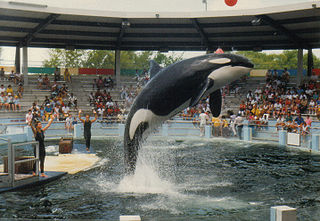
Lolita, also called Tokitae or Toki for short,, was a captive female orca of the southern resident population captured from the wild in September 1970 and held in captivity and displayed at the Miami Seaquarium in Florida until her death in August 2023. At the time of her death, Lolita was the second-oldest orca in captivity after Corky at SeaWorld San Diego.
Sealand of the Pacific was a public aquarium in South Oak Bay at the Oak Bay Marina, near the city of Victoria, in British Columbia, Canada. It housed a number of orcas: Haida, Nootka, and Tilikum. In 1991, all three were involved in an incident in which a trainer, Keltie Byrne, was killed. The aquarium subsequently closed and sold its orcas to SeaWorld.
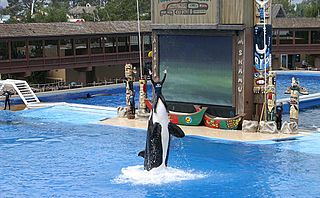
A marine mammal park is a commercial theme park or aquarium where marine mammals such as dolphins, beluga whales and sea lions are kept within water tanks and displayed to the public in special shows. A marine mammal park is more elaborate than a dolphinarium, because it also features other marine mammals and offers additional entertainment attractions. It is thus seen as a combination of a public aquarium and an amusement park. Marine mammal parks are different from marine parks, which include natural reserves and marine wildlife sanctuaries such as coral reefs, particularly in Australia.
Canada's Accredited Zoos and Aquariums is an accreditation and advocacy organization representing zoos and aquariums within Canada. The organization states that its member zoos and aquariums care for more than 100,000 individual animals representing over 2000 species of wildlife, observed by an estimated 11 million visitors each year. The organization is a member of the International Union for Conservation of Nature and the World Association of Zoos and Aquariums.

Springer, officially named A73, is a wild orca from the Northern Resident Community of orcas, which frequents the waters off the northern part of Vancouver Island every summer. In January 2002, Springer, then a calf developmentally equivalent to a human toddler, was discovered alone and emaciated some 250 miles from the territory of her family. Experts identified Springer by her vocal calls that are specific to her family, or "pod," and by examining photographs of her eye patch. They were also able to determine where Springer's pod was currently located.
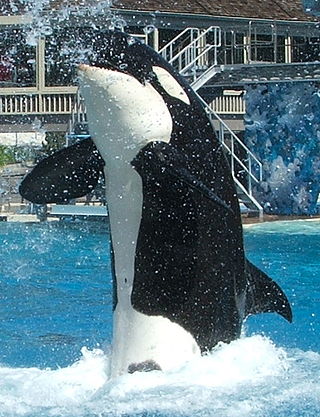
Dozens of orcas are held in captivity for breeding or performance purposes. The practice of capturing and displaying orcas in exhibitions began in the 1960s, and they soon became popular attractions at public aquariums and aquatic theme parks due to their intelligence, trainability, striking appearance, playfulness, and sheer size. As of 24 March 2024, around 55 orcas are in captivity worldwide, 33 of which were captive-born. At that time, there were 18 orcas in the SeaWorld parks.

Michael Andrew Bigg was an English-born Canadian marine biologist who is recognized as the founder of modern research on killer whales. With his colleagues, he developed new techniques for studying killer whales and, off British Columbia and Washington, conducted the first population census of the animals anywhere in the world. Bigg's work in wildlife photo-identification enabled the longitudinal study of individual killer whales, their travel patterns, and their social relationships in the wild, and revolutionized the study of cetaceans.
Captured in 1964, Moby Doll was the first orca to survive in captivity for more than two days, and the second to be displayed in a public aquarium exhibit. The availability, for the first time, of an orca that could be studied at close quarters alive initiated pioneering research. From a recording of Moby Doll's calls, he was years later identified as a member of J Pod of the southern resident orcas.

The Marine Life Park is a part of Resorts World Sentosa, Sentosa, situated in southern Singapore. The 8-hectare (20-acre) park is home to two primary attractions—the S.E.A. Aquarium and Adventure Cove Waterpark. Upon its opening in 2012, the S.E.A. Aquarium had the distinction of being the world’s largest oceanarium and public aquarium, a title it held through 2014, until it was surpassed by Chimelong Ocean Kingdom.

Morgan is a female orca who was rescued in the Wadden Sea, off the northwestern coast of the Netherlands in June 2010. She was found in an unhealthy condition, severely underweight and malnourished. She lived several months at the Dolfinarium Harderwijk in the Netherlands. After it became clear that the basin at Dolfinarium was too small, multiple options were considered, including releasing Morgan and transferring her to another facility. Over a year later, after litigation and debate between scientists, a Dutch court ruled that she was to be moved. Morgan was transported to the Loro Parque in Spain in November 2011.

The Ending the Captivity of Whales and Dolphins Act is an act of the Parliament of Canada. Passed into law in 2019, the Act bans the capture and keeping in captivity of cetaceans. There is a grandfather clause for cetaceans in captivity when the law first came into force, and other exceptions, such as where a provincial government has issued a licence to keep cetaceans for research purposes.
















